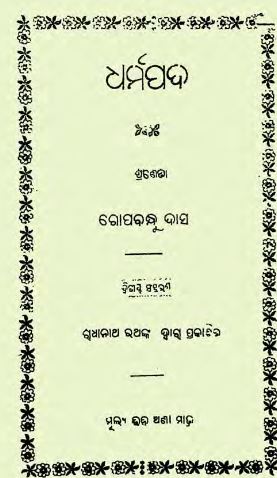Dharmapada,” published in 1927, is a significant contribution to Odia literature by the acclaimed poet Gopabandhu Das. This poetry collection stands as a powerful testament to the rich cultural and spiritual heritage of Odisha, and it encapsulates the poet’s deep philosophical insights, social consciousness, and profound reflections on life and duty.
At its core, “Dharmapada” is a meditation on the principles of righteousness (dharma) and the moral obligations that govern human existence. Gopabandhu Das intricately weaves together themes of spirituality, morality, social justice, and the human condition, inviting readers to reflect on their own lives and the greater purpose of their actions. The title, derived from ancient texts, signifies the essence of righteous living and ethical conduct, making it a timeless guide for readers.
The collection begins with an exploration of the concept of dharma as an integral part of human life. Gopabandhu emphasizes the importance of fulfilling one’s responsibilities towards family, society, and the divine. His verses reflect a deep understanding of ethical living, urging readers to commit to their duties with integrity and compassion.
Nature serves as a recurring motif throughout “Dharmapada,” with the poet often drawing inspiration from the beauty and harmony of the natural world. Through vivid imagery, Gopabandhu underscores the interconnectedness of all living beings and the divine, portraying nature as a reflection of spiritual truths. His reverence for the environment resonates with contemporary themes of ecological awareness and stewardship.
Gopabandhu Das was not only a poet but also a social reformer. In “Dharmapada,” he touches upon the themes of social justice and equality, advocating for the upliftment of marginalized communities. His verses challenge societal norms and call for compassion and empathy towards all, irrespective of caste or creed. This progressive outlook remains relevant in today’s socio-political landscape, inspiring readers to work towards a more equitable society.
The poet also delves into the introspective aspects of life, encouraging readers to seek inner peace through meditation and self-reflection. His lyrical expressions highlight the importance of connecting with one’s inner self and the divine as a pathway to finding tranquility amidst the chaos of the world.The concluding verses of “Dharmapada” encapsulate the essence of life’s journey, portraying it as a pilgrimage filled with trials, tribulations, and moments of enlightenment. Gopabandhu’s reflections on human experiences, joys, and sorrows resonate with the universality of the human condition, making his poetry accessible and relatable to readers across generations.
Dharmapada by Gopabandhu Das is more than just a collection of poetry; it is a philosophical guide that encourages readers to embody the principles of dharma in their daily lives. With its rich imagery, profound themes, and socially conscious messages, this work continues to inspire and provoke thought among Odia readers and beyond. Gopabandhu Das’s masterful use of language and his insightful exploration of the human spirit ensure that “Dharmapada” remains a cherished landmark in Odia literature, inviting all to reflect on the deeper meanings of life, duty, and righteousness.
Books Info
| Books name | Dharmapada |
| Author | Gopabandhu Das |
| No Of pages | 59 |
| Publisher | Radhanath Ratha |
| Publication | 1927, 2e. |
| Printed At | NA |
| Distributor | NA |

